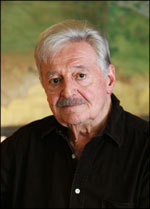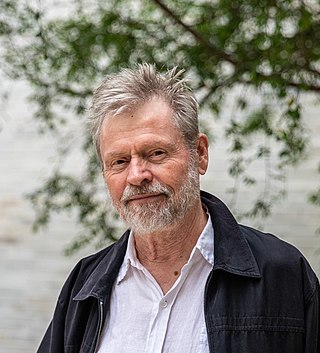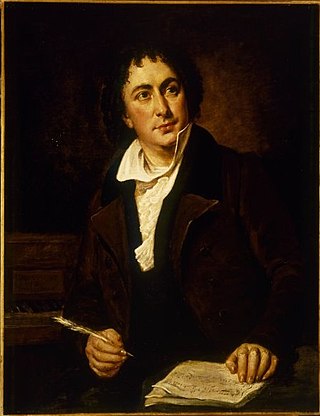Related Research Articles
Atonality in its broadest sense is music that lacks a tonal center, or key. Atonality, in this sense, usually describes compositions written from about the early 20th-century to the present day, where a hierarchy of harmonies focusing on a single, central triad is not used, and the notes of the chromatic scale function independently of one another. More narrowly, the term atonality describes music that does not conform to the system of tonal hierarchies that characterized European classical music between the seventeenth and nineteenth centuries. "The repertory of atonal music is characterized by the occurrence of pitches in novel combinations, as well as by the occurrence of familiar pitch combinations in unfamiliar environments".

Karol Maciej Szymanowski was a Polish composer and pianist. He was a member of the modernist Young Poland movement that flourished in the late 19th and early 20th century.

Peter Joshua Sculthorpe was an Australian composer. Much of his music resulted from an interest in the music of countries neighbouring Australia as well as from the impulse to bring together aspects of Aboriginal Australian music with that of the heritage of the West. He was known primarily for his orchestral and chamber music, such as Kakadu (1988) and Earth Cry (1986), which evoke the sounds and feeling of the Australian bushland and outback. He also wrote 18 string quartets, using unusual timbral effects, works for piano, and two operas. He stated that he wanted his music to make people feel better and happier for having listened to it. He typically avoided the dense, atonal techniques of many of his contemporary composers. His work was often characterised by its distinctive use of percussion. As one of the compositional pioneers of a distinctively Australian sound, Sculthorpe and his music have been likened to the role played by Aaron Copland in America's musical coming of age.

George Perle was an American composer and music theorist. As a composer, his music was largely atonal, using methods similar to the twelve-tone technique of the Second Viennese School. This serialist style, and atonality in general, was the subject of much of his theoretical writings. His 1962 book, Serial Composition and Atonality: An Introduction to the Music of Schoenberg, Berg, and Webern remains a standard text for 20th-century classical music theory. Among Perle's awards was the 1986 Pulitzer Prize for Music for his Wind Quintet No. 4.

In music, modernism is an aesthetic stance underlying the period of change and development in musical language that occurred around the turn of the 20th century, a period of diverse reactions in challenging and reinterpreting older categories of music, innovations that led to new ways of organizing and approaching harmonic, melodic, sonic, and rhythmic aspects of music, and changes in aesthetic worldviews in close relation to the larger identifiable period of modernism in the arts of the time. The operative word most associated with it is "innovation". Its leading feature is a "linguistic plurality", which is to say that no musical language, or modernist style, ever assumed a dominant position.
Inherent within musical modernism is the conviction that music is not a static phenomenon defined by timeless truths and classical principles, but rather something which is intrinsically historical and developmental. While belief in musical progress or in the principle of innovation is not new or unique to modernism, such values are particularly important within modernist aesthetic stances.
Sir Lennox Randal Francis Berkeley CBE was an English composer.
Samuel Hans Adler is an American composer, conductor, author, and professor. During the course of a professional career which ranges over six decades he has served as a faculty member at both the University of Rochester's Eastman School of Music and the Juilliard School. In addition, he is credited with founding and conducting the Seventh Army Symphony Orchestra which participated in the cultural diplomacy initiatives of the United States in Germany and throughout Europe in the aftermath of World War II. Adler's musical catalogue includes over 400 published compositions. He has been honored with several awards including Germany's Order of Merit – Officer's Cross.
Jacques Hétu was a Canadian composer and music educator. Hétu is the most frequently performed of Canadian classical composers, both within Canada and internationally.

Daron Aric Hagen is an American composer, writer, and filmmaker.

Richard Graham Meale, AM, MBE was an Australian composer of instrumental works and operas.

Ross Edwards is an Australian composer of a wide variety of music including orchestral and chamber music, choral music, children's music, opera and film music. His distinctive sound world reflects his interest in deep ecology and his belief in the need to reconnect music with elemental forces, as well as restore its traditional association with ritual and dance. He also recognises the profound importance of music as an agent of healing. His music, universal in that it is concerned with age-old mysteries surrounding humanity, is at the same time connected to its roots in Australia, whose cultural diversity it celebrates, and from whose natural environment it draws inspiration, especially birdsong and the mysterious patterns and drones of insects. As a composer living and working on the Pacific Rim, he is aware of the exciting potential of this vast region.
Phillip Maurice Treloar is an Australian jazz drummer, percussionist and composer. In an extensive career devoted to creative pursuit Treloar has addressed himself to the problems of relationship found at the intersection of notated music-composition and improvisation. In 1987 Treloar coined the term, Collective Autonomy, to signify his endeavor in this field of work. Fundamental in this has been composition- and performance-development projects, with these at times involving electronic media. Collaborations have, and continue to be, crucial.
Tall Poppies Records is an Australian record label founded in September 1991 by Belinda Webster. It focuses on recording solo and chamber music in the classical genre. It is particularly dedicated to promoting the work of Australian composers.
Ian Munro is an Australian pianist, composer, and music educator. His career has taken him to many countries in Europe, Asia, North America, and Australasia.

Juan Carlos Paz was an Argentine composer and music theorist.
Rites of Passage is a music theatre work written by the Australian composer Peter Sculthorpe in 1972–73. It is often categorised as an opera, but it does not conform to the traditional concept of opera. It is written for dancers depicting the ritual of initiation of the Aranda people, an indigenous tribe; double SATB chorus singing words from Boethius and others; three percussionists, two tubas, piano (echoed), six cellos and four double basses; but no parts for individual singers. Sculthorpe drew on the approach espoused by Jean-Baptiste Lully, in which dance, drama and music are not separated.

Australian classical music has developed from early years in the Australian colonies, until today. Today, each state has an orchestra and there are many major venues where classical music is performed.
Peter James Leonard Klatzow was a South African composer and pianist known for his contributions to classical music in South Africa, particularly through his innovative use of tonality, integration of diverse cultural influences, and significant advancements in marimba music. He held academic positions at the University of Cape Town, where he became an emeritus professor of composition and director of the South African College of Music.

Symphony No. 6Sobre a linha das montanhas do Brasil is a composition by the Brazilian composer Heitor Villa-Lobos, written in 1944. It lasts about twenty-five minutes in performance.
References
- 1 2 3 Slonimsky, Nicolas and Kuhn, Laura (2001). "Hannan, Michael (Francis)". Baker's Biographical Dictionary of Musicians . Schirmer Books. ISBN 9780028655253. Online version. Retrieved 16 November 2015 (subscription required).
- ↑ Saintilan, Nicole; Schultz, Andrew; Stanhope, Paul (1996). Biographical Directory of Australian Composers, p. 101. Australian Music Centre Limited. ISBN 0646294199
- ↑ Hannan, Michael (2001). "The future of tertiary music training in Australia". Music Forum, Vol. 7, No. 3, pp. 14–17. Retrieved 13 November 2015.
- ↑ Southern Cross University. Staff directory: Michael Hannan. Retrieved 15 November 2015.
- 1 2 Skinner, Graeme (2007). Peter Sculthorpe: The Making of an Australian Composer, pp. 537–538; 570; 672. UNSW Press. ISBN 0868409413
- ↑ Hayes, Deborah (March 2009). "Review: Peter Sculthorpe: The Making of an Australian Composer by Graeme Skinner". Notes , Second Series, Vol. 65, No. 3, pp. 510–512. JSTOR 27669889. Retrieved 11 November 2015.
- ↑ Pleskun, Stephen (2014). A Chronological History of Australian Composers and Their Compositions: Vol. 4 1999–2013, pp. 144; 209; 404; 691. Xlibris Corporation. ISBN 1493135376
- ↑ Southern Cross University News. (31 October 2005). "SCU composer presents piano concert". Retrieved 15 November 2015.